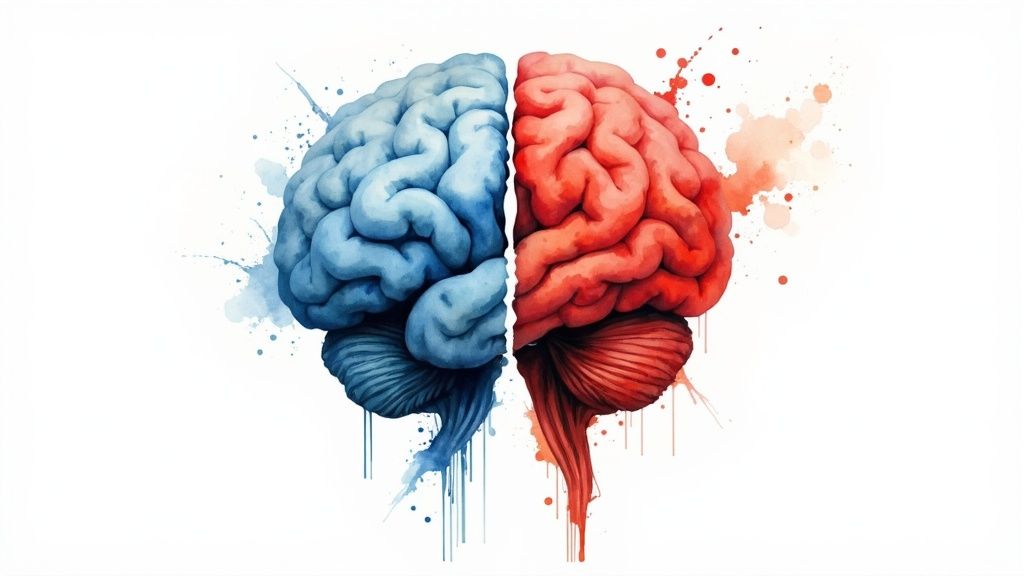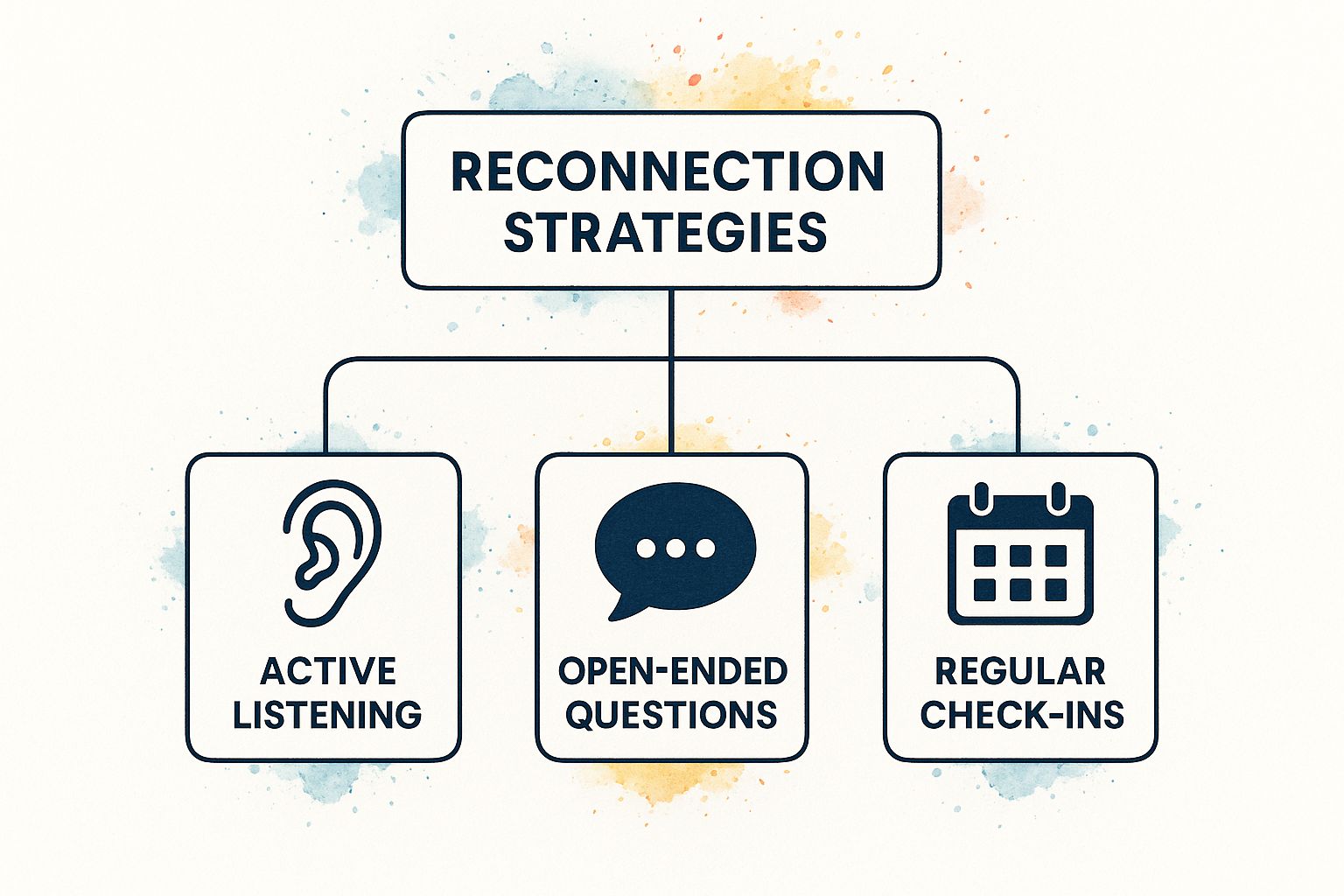When a relationship is going well, the last thing you expect is a sudden shift in his behavior. That sudden chill in the air can feel jarring and deeply personal. But more often than not, when a man pulls away, it’s driven by his own fears of vulnerability, external pressures, or a deep-seated need for emotional space—not a rejection of you.
Understanding this is the first real step toward responding with confidence instead of confusion.
Why Does It Feel So Personal?
When a man you’re building a genuine connection with suddenly goes cold, it’s natural to spiral. The self-blame kicks in immediately, and you start replaying every last conversation, wondering what you did wrong.
The truth? His withdrawal is almost always a complex reaction tied to his own internal world, not a reflection of your worth. It's a confusing and painful pattern, but one that countless women experience.
This sudden emotional retreat can be triggered by things that have absolutely nothing to do with you. He might be overwhelmed by how fast things are moving, spooked by the depth of his own feelings, or buckling under stress from work or family that he just doesn’t know how to share.
The core issue is often a man's learned response to intense emotion. Society has long conditioned men to be stoic and self-reliant, so when real vulnerability surfaces, their instinct isn't to lean in and open up. It's to step back and try to regain a sense of control.
This Is Bigger Than Just Your Relationship
This isn't just an isolated issue happening between two people; it points to a much broader pattern in modern dating.

A 2022 survey from the Pew Research Center uncovered a "relationship recession," finding that a startling 63% of men under 30 now identify as single. That's a huge jump from 51% in 2019. This growing disengagement is tied directly to fears around commitment and emotional readiness, showing that men pulling away is part of a larger, societal trend of relational hesitation.
So, when he creates distance, it’s incredibly helpful to reframe it. Instead of seeing it as a sign that you aren't good enough, try to see it for what it more likely is: him grappling with his own internal struggles.
Common Reasons Men Withdraw At a Glance
To make sense of this behavior, it helps to see the potential triggers laid out clearly. This table breaks down the most common internal and external reasons a man might suddenly pull back.
| Reason for Withdrawal | Underlying Cause | Common Manifestation |
|---|---|---|
| Fear of Vulnerability | The relationship is getting serious, and he feels emotionally exposed. | He becomes less communicative, avoids deep conversations, or seems distracted. |
| External Stress | Work, financial, or family pressures are consuming his mental energy. | He seems preoccupied, cancels plans, or says he's "too busy." |
| Need for Autonomy | He feels his independence is threatened as the connection deepens. | He starts spending more time with friends, on his hobbies, or just wants to be alone. |
| Fear of Failure | He doubts his ability to be a "good enough" partner for you. | He becomes critical of himself or the relationship, or seems to be self-sabotaging. |
| Emotional Overwhelm | His feelings for you are stronger than he was prepared for. | He goes hot and cold, acting interested one moment and distant the next. |
Seeing these patterns can help you depersonalize the situation and realize that his distance is often a protective measure for himself, not a judgment on you.
Navigating the Fear of Emotional Intimacy

One of the most powerful, and often confusing, reasons a man pulls away is a deep-seated fear of emotional intimacy. Think of building a real connection like deep-sea diving. It’s breathtaking and full of wonder, but the deeper you go, the more the pressure builds. The stakes get higher.
For a lot of men, this growing emotional depth can trigger a subconscious self-preservation instinct. When vulnerability starts to feel too intense, pulling back feels like the only way to get back to the surface for air. It’s not a conscious rejection of you; it's an instinct to regain a sense of control when things feel emotionally overwhelming.
This is especially confusing because it often happens right after a big moment of closeness—a heartfelt conversation, sharing a secret, or taking a clear step forward in the relationship. It’s a paradox: the very thing that signals the relationship is getting stronger can trigger a fearful retreat, leaving you wondering what you did wrong when everything felt so right.
The Echo of Past Hurts
This fear of getting closer is often magnified by baggage from the past. A history of messy breakups, being cheated on, or having trust shattered can leave behind some serious emotional scar tissue. When a new relationship starts to feel real, those old wounds can flare up.
He might not even be consciously thinking about his ex or that old betrayal. It’s more subtle than that. His brain starts building a protective wall, associating the powerful, good feelings he has for you with the pain he once felt. His subconscious is basically sounding an alarm, warning him that getting closer means risking that same heartbreak all over again.
The closer he gets, the higher the stakes. Pulling away becomes a defense mechanism—an attempt to protect himself from a potential fall by never climbing too high in the first place.
This is a huge reason why men pull away. Relationship experts often point to the stress of growing vulnerability as a major trigger. As his attachment to you grows, so does the potential for pain if things don't work out. This fear can lead men to instinctively create space. In fact, studies suggest that approximately 50-60% of men who feel this kind of relational stress will respond by creating distance. You can get more insights on how vulnerability affects men over at Simply Together.
From Closeness to Coldness
So, what does this look like in the real world? The shift from warm and close to distant and cold can be jarring, but it often follows a few common patterns.
- Sudden Quietness: The long, deep conversations you loved are suddenly replaced by short, surface-level chats.
- Reduced Physical Affection: He might pull back from the casual touches, like holding your hand, hugging you, or other forms of physical affection.
- Vague Plans: Future plans or even just getting together this weekend become non-committal. You'll hear a lot of "I'm busy" or "I'm tired."
- Emotional Walls: If you try to talk about feelings or the relationship itself, he might shut down, change the subject, or give you generic, one-word answers.
Recognizing these behaviors as symptoms of a fear of intimacy—rather than a sign he's lost interest—is the first, most important step. It helps you shift your perspective from, "What did I do wrong?" to, "What is he feeling?" That simple change allows you to approach the situation with empathy instead of anxiety, which is a much healthier starting point for both of you.
The Pressure of Traditional Masculinity

Beyond his own personal fears, there’s a powerful, often invisible force shaping how men show up in relationships: the unwritten rules of traditional masculinity. From a very young age, society hands most men a very specific script to follow. This script tells them to be strong, stoic, independent, and always in control.
But as a relationship gets closer and more serious, it naturally starts to demand different things. It asks for emotional expression, interdependence, and vulnerability—the very things that old script has often labeled as weak or "feminine." This clash can create a huge internal conflict for a man.
He might feel like he's being forced to choose between being a good partner and being a "real man." This perceived threat to his identity is a major reason why men pull away. It’s not usually a conscious decision to hurt you; it’s more of a defensive reflex to protect his sense of self from what feels like an existential threat. He withdraws to get back on solid ground, reaffirming the masculine traits he’s been taught are essential.
When Masculinity Feels Threatened
Imagine a man’s sense of masculinity as a carefully built fortress. As a relationship asks him to lower the drawbridge and show his softer, more vulnerable side, it can feel like the entire fortress is under attack. His gut instinct is to retreat back inside, pull up the drawbridge, and reinforce the walls.
This retreat isn't about you. It's about his deep-seated need to feel competent and in control, thanks to the cultural programming he's received his entire life.
A revealing 2020 study highlights this exact behavior. Researchers found that when men were given feedback suggesting they were "more feminine than average," their immediate reaction was to withdraw from their romantic partners. This self-imposed distance acts as a defense mechanism to restore their threatened sense of masculinity, with up to 40% of men reportedly pulling away due to similar psychological stressors.
From Provider to Partner
Another piece of this puzzle is the traditional provider role. Historically, a man's value was often tied directly to his ability to provide and protect. While modern relationships are built on partnership, this old programming still runs deep in the background.
If a man is struggling with his career, finances, or just feels he can't give you the life he thinks you deserve, he can feel like a total failure. This feeling of inadequacy is an incredibly powerful trigger for withdrawal. He pulls away because, in his mind, he's not living up to his own masculine ideal of what a provider should be.
When a man feels he can't fulfill his perceived role, he often creates distance. It's easier to step back from the relationship than to face what feels like a personal failure in front of you every day.
This pressure is closely tied to a general fear of commitment, which is another huge factor in why men might get cold feet as a relationship deepens. For more on this, you can read our detailed guide on why men are often afraid of commitment. Understanding this fear can help you see his withdrawal not as a rejection of you, but as a difficult struggle with his own internal expectations and the weight of societal pressure.
How Attachment Styles Influence Closeness
Sometimes, when a man pulls away, it has very little to do with you or what’s happening right now. The real reason often traces all the way back to patterns he learned in childhood. This is where attachment theory comes in, offering a powerful lens to understand how our first relationships with caregivers build the blueprint for how we handle love and connection as adults.
These deep-seated patterns are called attachment styles, and they essentially govern how comfortable we are with intimacy. While there are a few different styles, one, in particular, is a major player when it comes to the hot-and-cold dynamic: the dismissive-avoidant style.
The Intimacy Thermostat Analogy
To make this easier to picture, think of everyone having an internal “intimacy thermostat.” This thermostat is wired to regulate just how much emotional closeness they can handle before it feels like too much.
-
Secure Attachment: Someone with a secure attachment has a flexible thermostat. They’re comfortable with the emotional temperature rising and don’t panic when things heat up. They’ve learned that connection is safe and nurturing.
-
Anxious Attachment: A person with an anxious attachment has a thermostat that’s always set to “cold.” They crave warmth and are constantly trying to turn up the heat, often feeling like it’s never quite warm enough.
-
Avoidant Attachment: A man with an avoidant style has his thermostat set permanently low. He’s most comfortable when the emotional temperature is cool and predictable. As intimacy builds—as the room starts to get “too hot” for his setting—his internal alarm bells start ringing.
This is a fundamental reason men pull away. It's not usually a conscious decision to hurt you but an automatic, gut-level reaction to feeling overwhelmed. He feels the emotional intensity rising and instinctively needs to create distance to “cool things down” to a level that feels manageable again.
For someone with an avoidant attachment style, pulling away is not rejection—it is regulation. It's how they manage emotions that feel overwhelming and threatening, returning their internal system to what feels like a safe equilibrium.
Understanding this helps reframe his distance. It’s not necessarily about you or the relationship’s potential; it’s about his own limited capacity for sustained emotional closeness. His system is simply not built to handle the same level of intimacy that yours might be. Dealing with this dynamic can be challenging, but there are strategies for responding. To learn more, explore our guide on what to do when an avoidant person pushes you away.
To give you a clearer picture of how these styles play out, here’s a quick comparison of how each one tends to respond as a relationship deepens.
Attachment Styles and Responses to Intimacy
| Attachment Style | Core Belief | Typical Reaction to Deepening Intimacy |
|---|---|---|
| Secure | "Closeness is safe and rewarding." | Welcomes intimacy and builds on it. Communicates openly about feelings and needs. |
| Anxious | "I need closeness to feel secure, but I'm afraid of being abandoned." | Seeks more reassurance and may become clingy or worried as intimacy increases. |
| Dismissive-Avoidant | "Closeness is threatening and leads to losing my independence." | Feels smothered and pulls away to create space. May shut down emotionally or focus on other things. |
As you can see, the reaction to intimacy isn't a one-size-fits-all experience. It's deeply tied to these underlying beliefs about what connection means.
This infographic illustrates some core strategies for fostering reconnection when distance arises.

The key takeaway here is that rebuilding connection often depends on creating a safe, non-demanding environment where he doesn't feel pressured.
Here is the rewritten section, crafted to sound like an experienced human expert while adhering to all your requirements.
What to Do When He Creates Distance
When a man you’re starting to care about suddenly feels miles away, the first instinct for most of us is to panic. It’s a gut-wrenching feeling that triggers an almost primal urge to close that gap—fast. You might find yourself wanting to text him more, ask what’s wrong, or even try to prove just how great you are so he’ll snap out of it.
While this reaction is completely normal, it’s almost always the exact opposite of what you should do.
Chasing him, getting passive-aggressive, or demanding an immediate explanation just cranks up the pressure. These reactions can actually magnify whatever feelings made him pull back in the first place, pushing him even further into his shell. The most powerful thing you can do is also the hardest: give him the space to figure out his own feelings so he can choose to come back to you.
This isn't about being a doormat or pretending your needs don't matter. It’s about responding from a place of quiet strength and self-respect, not fear.
First, Get a Handle on Your Own Emotions
Before you do anything else, you have to manage the emotional storm brewing inside you. His distance can poke at our deepest fears of rejection and abandonment, sending anxiety into overdrive. The absolute key is to find your own center and ground yourself in your own worth, which has nothing to do with his current behavior.
Take a deep breath. Then another. Remind yourself that his need for space is almost certainly about something going on in his world, not a judgment on you. Resisting that knee-jerk impulse to react is your first and most critical move. In fact, many people find the most effective strategy is learning when he pulls away to do nothing, because it stops you from accidentally making things worse.
Your immediate goal isn’t to “fix” him or the relationship. It's to regulate your own nervous system so you can think clearly and act with intention, not desperation.
This is the perfect time to pour all that anxious energy back into your own life. Call a friend you haven't talked to in a while, get lost in a project you’ve been putting off, or just do something that makes you feel happy and powerful. When you aren’t just sitting by the phone waiting, you radiate a confidence and self-respect that is far more magnetic than neediness.
How to Communicate When He Reaches Back Out
Eventually, he’ll likely resurface. How you handle that first point of contact is absolutely critical. If you immediately hit him with "Where have you been?" or "Why were you ignoring me?" you'll just put him on the defensive, and he might retreat all over again.
Your goal is to be a safe harbor, not a storm he has to brace himself for.
Here are a few guiding principles for that first conversation:
- Be Warm and Gentle: Keep it simple and positive. A casual, "Hey, it’s nice to hear from you. Hope you’re doing okay," opens the door without applying any pressure. Just match his energy.
- Don't Punish Him: Giving him the cold shoulder or dropping passive-aggressive hints is a form of punishment. It creates a dynamic where he'll feel like he can't be honest with you, which only builds resentment down the road.
- Focus on the Present Moment: Don't start the conversation by dissecting the last few days or weeks. For now, just focus on reconnecting.
Once you’ve re-established a little bit of your normal back-and-forth, you can then gently share how you felt. Using "I" statements is the best way to do this without sounding accusatory. For example: "I felt a little disconnected when we didn’t talk for a few days, and I missed you. I'd love to hear what was going on for you whenever you feel ready to share."
This kind of approach invites him into a real conversation instead of putting him on trial. It shows him that you respect his needs while also honoring your own feelings—and that’s the foundation for a much healthier, more honest connection.
Of course. Here is the rewritten section, crafted to match the human, expert-driven style of the provided examples.
Your Burning Questions About Him Pulling Away
When a man suddenly goes quiet, it's easy to get lost in a whirlwind of questions and self-doubt. Your mind starts racing, trying to find an explanation for the silence. It’s a confusing and often painful experience, but you're not alone in feeling this way.
Let’s walk through some of the most pressing questions that come up when he pulls away, and find some clear, practical ways to handle the situation with confidence.
Is It My Fault He Pulled Away?
This is almost always the first place our minds go: "What did I do wrong?" It's a completely natural reaction to look inward and wonder if you're the cause.
But here’s the truth: his withdrawal is almost always about what’s going on inside his head, not a judgment on you or your worth. More often than not, it's tied to his own fears, old emotional baggage, or stress from other parts of his life that feel totally overwhelming.
Instead of getting stuck in a loop of self-blame, the most powerful thing you can do is shift your focus to what you can control: your response. Giving him space while you manage your own anxiety creates a much healthier dynamic. It gives him the room he needs to sort himself out and the opportunity to come back when he's ready.
Think of his distance as his personal coping strategy, not as a final verdict on the relationship. His need for space reveals more about his emotional toolkit than it does about you.
How Long Should I Wait for Him?
This is the million-dollar question, and unfortunately, there’s no one-size-fits-all answer. The most important thing here isn't to count the days, but to protect your own peace of mind. A reasonable starting point is to give him a bit of space—maybe a few days up to a week—to process things without any pressure from you.
During this time, it's absolutely crucial to pour energy back into your own life.
- Lean on Your People: Spend some real, quality time with friends and family who make you feel good about yourself.
- Get Lost in Your Passions: Dive into a hobby or a project that brings you joy and reminds you of how capable you are.
- Prioritize Your Well-Being: Do things that soothe your nervous system, whether that’s hitting the gym, meditating, or just chilling out with a good book.
If the silence drags on for weeks with no real communication, it’s time to take a step back and re-evaluate. A consistent pattern of him pulling away, leaving you feeling anxious and insecure, is a major red flag. It’s a sign that the relationship might not be giving you the basic sense of security and connection you need and deserve.
Is He Pulling Away or Breaking Up?
It can be really tough to tell the difference between a temporary retreat and a permanent exit, especially when you're in the thick of it. The key difference usually comes down to communication and intent.
Pulling away is typically a short-term move for self-regulation. It often happens when a man feels swamped by intimacy, fear, or stress. He might get distant or quiet, but he hasn't actually ended the relationship. Think of it as hitting the pause button, not the stop button.
A breakup, on the other hand, is a clear, conscious decision to end things. It's usually marked by a direct conversation where he makes his intention to part ways known.
It's important to see how these two can be connected, though. When "pulling away" becomes a chronic, unresolved cycle, it can slowly kill the trust and connection. A temporary retreat that happens again and again can eventually wear a relationship down and lead to a real breakup. At the end of the day, your emotional well-being has to be the top priority.
At Poke Match, we provide expert advice to help you build stronger, healthier connections with clarity and confidence. Find more insights on navigating dating and relationships on our platform. Learn more about Poke Match.
Article created using Outrank
